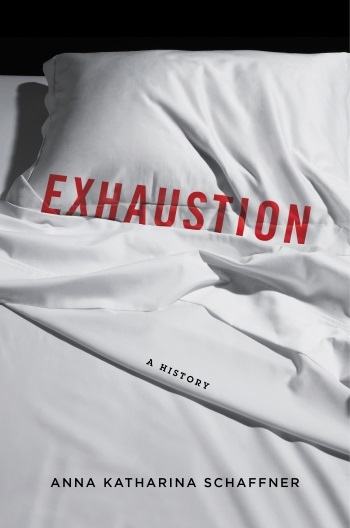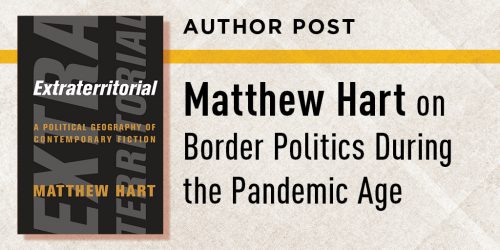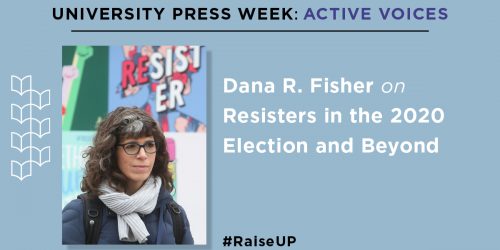On Exhaustion and Human Energy
The following is a post by Anna Katharina Schaffner, author of Exhaustion: A History:
Exhaustion is frequently represented as a distinctly modern phenomenon caused by acceleration, new modes of communication and transportation, and changes in the nature and organization of work. Our own age, many commentators claim, is the most exhausting in history: having become slaves to our gadgets and victims of neoliberal techno-capitalist competition, more people than ever suffer from exhaustion-related syndromes such as burnout, stress, and depression. Commentators arguing that our levels of exhaustion are unprecedented in human history imagine the past as a much less energy-draining time in which people lived life at a slower pace in harmony with nature and the seasons.
However, I asked myself whether that was really the case, and decided to research other historical periods in search of exhaustion discourses. To my surprise, I found that writers in virtually every period have reflected on exhaustion and theorized its causes. The mental and physical symptoms of exhaustion feature prominently in a range of historical diagnoses from classical antiquity to the present day. These diagnoses include acedia in the medieval period, melancholia in classical antiquity, the Renaissance, and the eighteenth century, neurasthenia in the nineteenth century, and depression, stress, burnout, and Chronic Fatigue Syndrome in the twentieth and twenty-first centuries. Exhaustion, it seems, is in fact a perennial human concern, related to our anxieties about illness, ageing, the waning of our engagement with the world, and death.
Yet in each period the causes and effects of exhaustion are theorized in radically different ways. The kind of exhaustion in which I am interested (not merely physical exhaustion resulting from exertion or somatic illnesses that can be alleviated by resting) involves the mind, the body, and the social. In each period, the interplay between these three forces is imagined in different ways. Sometimes, a biological explanation is privileged, sometimes the explanation is psychological or spiritual, and sometimes it is psychosocial or cultural.
The causal explanations of exhaustion are diverse, ranging from biochemical imbalances, somatic ailments, and viral diseases to spiritual failings (monks suffering from acedia were seen as weak in their faith). In the past, exhaustion has also been linked to loss, the alignment of the planets, a perverse desire for death, and socio-economic disruption. Being exhausted has also frequently been associated with individual exceptionality, and qualities such as sensitivity, creativity, high intelligence, and, more recently, a strong work ethic. To say that one is stressed or burnt out implies that one works hard and is much in demand. To be exhausted can thus become a badge of honor.
Each theory of exhaustion also involves conceptions of agency, willpower, and responsibility for one’s state of well-being. In the Middle Ages, for example, giving in to exhaustion was considered a grave spiritual failing, a result of weak faith. Often, the causes of exhaustion are thought to be external, such as the hustle and bustle of urban life, over-stimulation of the senses, stressful working environments, or viral diseases. Frequently, it is also assumed that one’s mental state plays a major role in states of exhaustion, either as a cause or as a consequence of exhaustion. Hopelessness, weariness, disillusionment, and lack of engagement can all be both symptoms and exhaustion-generators. Social factors, too, can impact on an individual’s energy levels, such as optimism about the political future of a country or wide-ranging cultural pessimism.
*
It is impossible to talk about exhaustion without talking about its conceptual opposite: human energy. But what is human energy? How can we define and quantify it? Although there are numerous theorizations of the exhaustion of human energy, human energy in modern Western medical and psychological accounts is generally defined ex negativo, that is, via analyses of pathological states of energy depletion. Apart from the prosaic thermo-chemical calorie model deployed in nutritional science, there are currently no scientifically accepted models of human energy available in Western medicine.
Even in the psychoanalytical tradition, Freud’s and his successors’ theories of libido, and of drive energy more generally, remain strikingly vague. Human energy is a concept that is often taken for granted and very rarely defined. In spite of its importance and increasing fears about the chronic depletion of our energies owing to a rapidly changing work culture and new psychological pressures in the age of techno-capitalism, the discourse on human energy often remains in the domain of esoteric speculation and is frequently dismissed as pseudoscience.
Many Eastern cultures, in contrast, have been characterized by widely accepted models of human energy, such as the chakras and prana in the Indian tradition, qi in Chinese Medicine, and auras and energy fields in shamanic cultures. In the West, too, more explicit concepts of human or life energy are to be found in the pre-modern era: Galen, for example, refers to the ‘animal spirits’, the Stoic philosophers develop the notion of ‘pneuma’, and, more recently, thinkers from the vitalist tradition have theorized the ‘élan vital’. However, the tradition of widely accepted models of human energy arguably ends with Freud’s notion of libido. While we have seen the rise of ‘energy psychology’ in recent years, a holistic, integrative school of thought that seeks to combine conventional therapeutic approaches with techniques from yoga, qi gong, acupressure, and energy medicine, combining insights from neurobiology and Cognitive Behavioural Therapy with ancient wisdom, the models proposed by these practitioners are far from being universally accepted.
Although references to human energy are ubiquitous both in popular and in medical discourse, the concept remains vague. Why has the analysis of human energy been relegated to the realms of the esoteric and the pseudo-scientific in modern Western culture? The fact that ours is an age in which scientistic, positivistic, and purely evidence-based bio-medical materialism dominates has certainly contributed to the neglect of this concept, and to the tendency to leave it profoundly underdetermined. Holistic medical conceptions of the mind–body nexus have increasingly fallen from favor in modern medicine. However, given that concerns about burnout, stress, and depression – all of which involve a lack of energy—have risen sharply in recent decades, and that an entire industry is now dedicated to boosting human energy (be it psychological or physical), the silence of the medical establishment on the matter is striking. Over the past five to ten years, there has been a noticeable influx of non-Western practices and approaches into Western culture, most notably, mindfulness, but also other ancient practices that have been incorporated into the therapeutic repertoire of psychologists and general practitioners. It seems that the West is increasingly willing to turn to the East when it comes to questions pertaining to mind–body dynamics that cannot be quantified and measured in the standard statistical way.
Human energy remains, then, a curiously under-researched phenomenon, in spite of the centrality of human energy to conceptions of mind and body, work and leisure, well-being and illness. In the age of stress, burnout, and depression, the need for a working definition of human energy has become ever more pressing, and we can learn from both historical Western and Eastern sources in order better to understand these conditions, as well as becoming aware of the limits of our own bio-medical paradigm.
Energy in the sciences can be expressed in neat formula, it can be quantified and measured, and its behavior can be described in terms of laws. No such thing is possible when it comes to human energy. We can only ever observe the effects of human energy, or else the effects of its absence—which is what exhaustion theorists have been doing for more than two thousand years.







